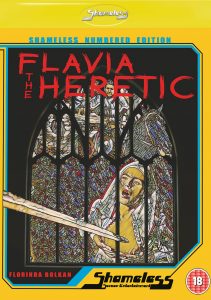 No doubt everyone has been consuming a vast amount of films during lockdown and it has not hampered the amount of releases available even if there have been no physical shops open to purchase them from. Of everything I have seen lately it is an old favourite that has gained its first UK blu-ray release that is the film that I have felt the urge to write about, Gianfranco Mingozzi’s startling period potboiler Flavia The Heretic from way back in 1974. As the back cover states, this is a film that has been lumped in with the nunsploitation sub-genre which means that it is part of a cannon of 70’s films that derived mainly from Italy around this time full of naked nuns frotting and dealing with enforced celibacy, many of them with nothing more to them than pure exploitative titillation. Much as we enjoy them, it is rare that a film like this has a message and meaning that is important and this is why Flavia is such a milestone as it has plenty of them and some profound subtext within its moving and passionate precis. Naturally the most famous and still totally contentious title that led to the gateway for the floodgate to open is Ken Russell’s 1971 opus The Devils which similarly to Flavia has nothing but contempt for the portrayed religiosity it displays and the reason it is still to this day held in limbo by rights holders Warner Brothers. Quickly, after it stunned audiences after original release we saw the salubrious delights such as Domenico Paolella’s Story Of A Cloistered Nun (1973), Sergio Grieco’s The Sinful Nuns Of Saint Valentine (1974), Norifumi Suzuki’s Japanese take School Of The Holy Beast (1974) Jess Franco’ who was naturally all over things like a nasty rash Love Letters Of A Portuguese Nun (1977), Giuseppe Vari’s Sister Emanuelle (1977) and Giulio Berruti’s video nasty Killer Nun (1978) to name just a few.
No doubt everyone has been consuming a vast amount of films during lockdown and it has not hampered the amount of releases available even if there have been no physical shops open to purchase them from. Of everything I have seen lately it is an old favourite that has gained its first UK blu-ray release that is the film that I have felt the urge to write about, Gianfranco Mingozzi’s startling period potboiler Flavia The Heretic from way back in 1974. As the back cover states, this is a film that has been lumped in with the nunsploitation sub-genre which means that it is part of a cannon of 70’s films that derived mainly from Italy around this time full of naked nuns frotting and dealing with enforced celibacy, many of them with nothing more to them than pure exploitative titillation. Much as we enjoy them, it is rare that a film like this has a message and meaning that is important and this is why Flavia is such a milestone as it has plenty of them and some profound subtext within its moving and passionate precis. Naturally the most famous and still totally contentious title that led to the gateway for the floodgate to open is Ken Russell’s 1971 opus The Devils which similarly to Flavia has nothing but contempt for the portrayed religiosity it displays and the reason it is still to this day held in limbo by rights holders Warner Brothers. Quickly, after it stunned audiences after original release we saw the salubrious delights such as Domenico Paolella’s Story Of A Cloistered Nun (1973), Sergio Grieco’s The Sinful Nuns Of Saint Valentine (1974), Norifumi Suzuki’s Japanese take School Of The Holy Beast (1974) Jess Franco’ who was naturally all over things like a nasty rash Love Letters Of A Portuguese Nun (1977), Giuseppe Vari’s Sister Emanuelle (1977) and Giulio Berruti’s video nasty Killer Nun (1978) to name just a few.
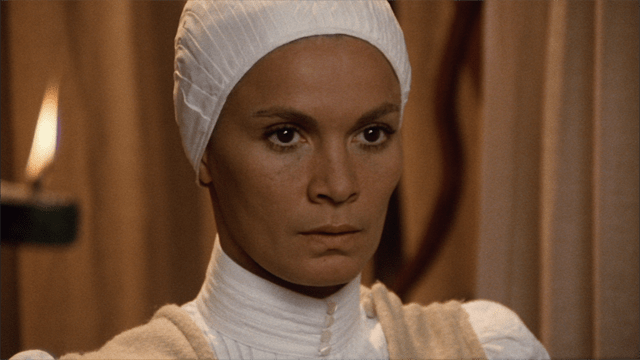
Many of these titles took us back to a time where daughters of Eve are sent to a nunnery by their privileged father’s and this indeed is the case of the film in question. Flavia is set in 15th century Apulia during Ottoman invasion of Otranto and has historical significance being based loosely on the Martyrs of Otranto, some 800 citizens who were beheaded after refusing to convert to Islam. Flavia (Florinda Bolkan) is sent packing to a monastery after falling out with her nobleman father and here she starts questioning more than just her faith. In a sheer bit of Monty Python insanity, the convent is visited by The Tarantula Sect, a cult who are allegedly inflicted with the bite of the spider and naturally sent a bit nuts. They sing, dance and generally act possessed, turning many of the nuns delirious as the cult’s insanity and desires spread through the convent. Flavia is taken under the wing of both Jewish scholar Abraham (Claudio Cassinelli) and matriarchal Sister Agata (María Casares) but that is after she falls foul of her father again over his treatment of a bewitched nun leading to some incredibly unpleasant torture scenes and whippings. Male dominance is literally spat upon by Flavia and treated with contempt, the vision of Christ comes from painting to life allowing her to address her hatred of it all as well as her own incarceration. “Why… why? Why is God male? The Father the Son and the Holy Ghost – all male. Even the twelve apostles. All twelve of them – males.” Freedom is what she craves and indeed she escapes the confines with Abraham looking after her, both are quickly captured by her father’s army but Prince Ahmed (Anthony Corlan) and his invading Moslem forces are just about to arrive and besiege the city. Agata and Flavia rejoice, the other world is coming to them, what will it be like, is it the answer they are looking for and will they be freed from servitude to a God they are ever closer to completely rejecting?
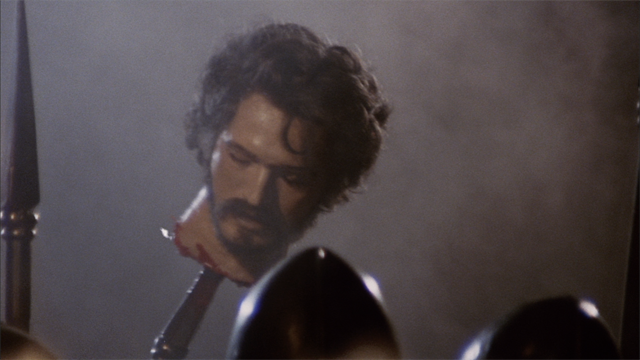
That’s the premise and to go further would spoil for those who have not seen the film before. There are so many other things in its favour apart from the plot. Brazilian actor Florinda Bolkan is superb as the marauding Flavia and plays the part with utter conviction. A staple of the Italian scene, anyone knowing her from the likes of Lucio Fulci’s Don’t Torture A Duckling (1972) and Francesco Prosperi’s Last House On The Beach (where she also dons the vestments) (1978) will know how fantastic she is. Indeed, she truly brings feminist strength and fortitude to the film in a way that could be similar (as are her features) to Sigourney Weaver several years later. The dialogue is inflammatory and veteran actor Casares literally has a hoot castigating running away town-folk, grabbing their balls and asking what use is their manhood now. Nicola Piovani brings a score that is both romantic and full of pathos and won’t be dislodged from your head for ages. The Italian scenery is gorgeous and as a contrast the violence and torture scenes are grizzly and still have an impact today.
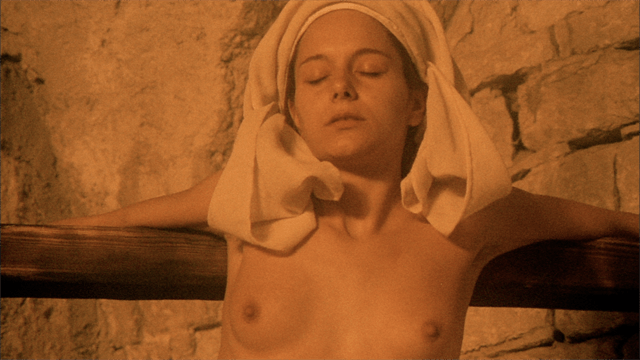
Naturally back in the 80’ Flavia has endured censorship wrath and really considering some scenes that is hardly surprising and it is only probably due to the fact that it was only because of its relative obscurity it didn’t end up on the video nasty list. Resurrected on tape by Nigel Wingrove’s Redemption films and possibly a catalyst to fuel his own directorial designs on Sacred Flesh (2000) it has been a film I have owned in various editions over the years. Thankfully Shameless have done a commendable job here, the film looks great, certain scenes even more eye-watering than I remember and although presented in English with no subtitle options, dialogue is loud and clear. Extras include a commentary track from Kat Ellinger and a 15-minute interview with Florinda.
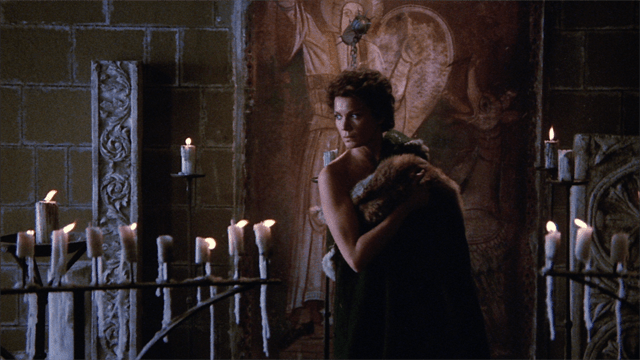
There’s no denying the fact that Flavia The Heretic is an angry film and also a visionary one too, spirited by the surrealism of the 70’s and with some hallucinatory scenes to rival The Devils itself. Standing the test of time brilliantly it is a film that should honestly for all its necessary nastiness stand up for critical approval. Every Lira is put into the filming of it and some fantastic camera angles especially those looming down through circular layers into a torture pit deep below show the visionary status of director Gianfranco Mingozzi who largely moved into documentary work after it and DP Alfio Continiwho, who shot Liliana Cavani’s infamous The Night Porter the same year. Simply put, Flavia is a hundred-minute face-slap against religion that’s guaranteed to leave you smarting. Highly recommended.
(Pete Woods)
https://www.shameless-films.com/product/flavia-the-heretic-blu-ray

Leave a Reply